Report on Management Information Systems: Issues and Principles
VerifiedAdded on 2020/04/13
|8
|1899
|123
Report
AI Summary
This report provides an overview of Management Information Systems (MIS), defining its role in organizations and its significance in data management. The report delves into the ethical, social, and legal issues associated with MIS, including data privacy, information security, and the misuse of data. It examines legal challenges such as computer crimes and copyright infringement, ethical considerations like data access and privacy breaches, and social expectations regarding the responsible use of information systems. Furthermore, the report outlines professional principles such as autonomy, privacy, non-maleficence, and justice, demonstrating their application in current and emerging technologies. The conclusion highlights the importance of MIS in providing timely information for effective management and emphasizes the need to address the ethical, legal, and social challenges to ensure responsible and effective use of information systems.

Running Head: Milestone 1
Milestone
Milestone
Paraphrase This Document
Need a fresh take? Get an instant paraphrase of this document with our AI Paraphraser
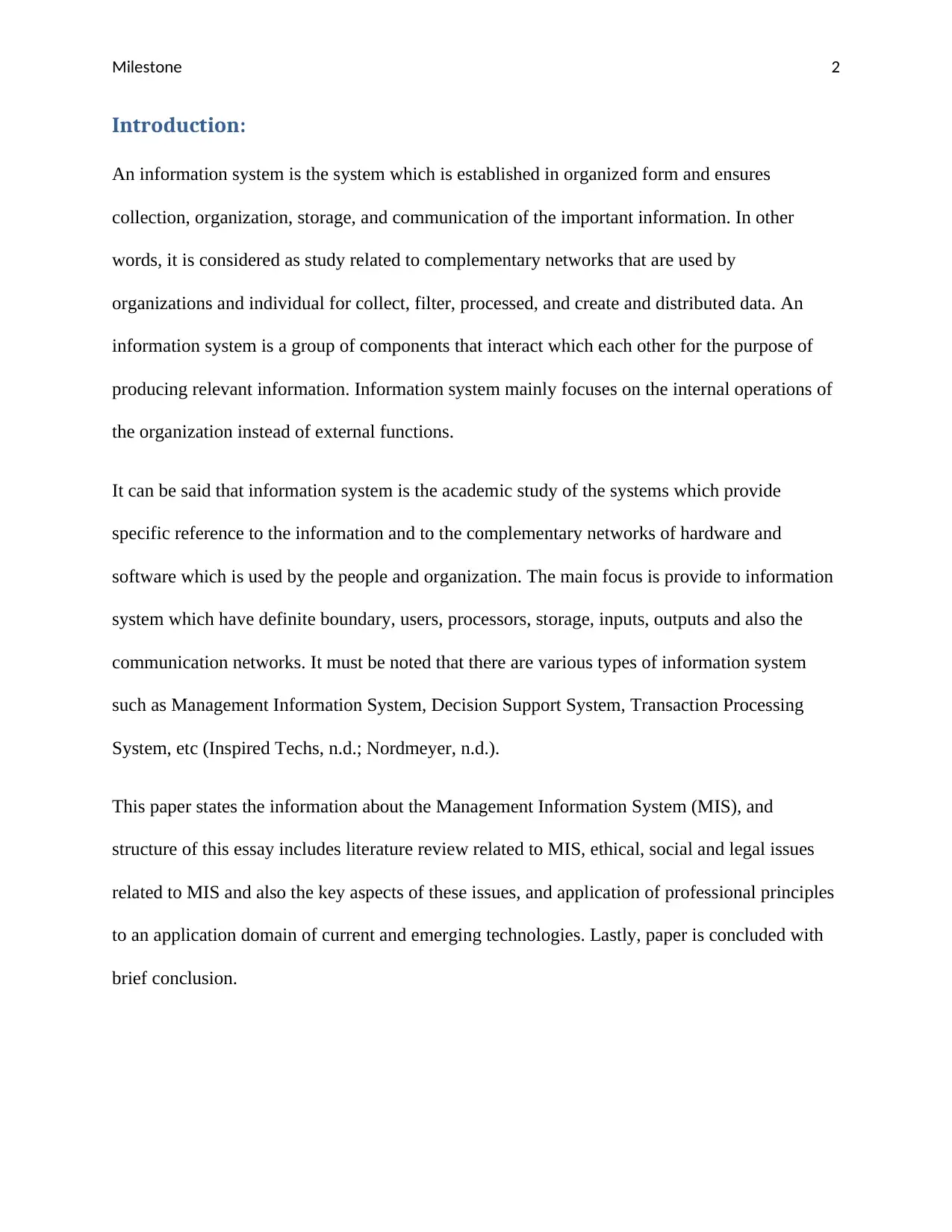
Milestone 2
Introduction:
An information system is the system which is established in organized form and ensures
collection, organization, storage, and communication of the important information. In other
words, it is considered as study related to complementary networks that are used by
organizations and individual for collect, filter, processed, and create and distributed data. An
information system is a group of components that interact which each other for the purpose of
producing relevant information. Information system mainly focuses on the internal operations of
the organization instead of external functions.
It can be said that information system is the academic study of the systems which provide
specific reference to the information and to the complementary networks of hardware and
software which is used by the people and organization. The main focus is provide to information
system which have definite boundary, users, processors, storage, inputs, outputs and also the
communication networks. It must be noted that there are various types of information system
such as Management Information System, Decision Support System, Transaction Processing
System, etc (Inspired Techs, n.d.; Nordmeyer, n.d.).
This paper states the information about the Management Information System (MIS), and
structure of this essay includes literature review related to MIS, ethical, social and legal issues
related to MIS and also the key aspects of these issues, and application of professional principles
to an application domain of current and emerging technologies. Lastly, paper is concluded with
brief conclusion.
Introduction:
An information system is the system which is established in organized form and ensures
collection, organization, storage, and communication of the important information. In other
words, it is considered as study related to complementary networks that are used by
organizations and individual for collect, filter, processed, and create and distributed data. An
information system is a group of components that interact which each other for the purpose of
producing relevant information. Information system mainly focuses on the internal operations of
the organization instead of external functions.
It can be said that information system is the academic study of the systems which provide
specific reference to the information and to the complementary networks of hardware and
software which is used by the people and organization. The main focus is provide to information
system which have definite boundary, users, processors, storage, inputs, outputs and also the
communication networks. It must be noted that there are various types of information system
such as Management Information System, Decision Support System, Transaction Processing
System, etc (Inspired Techs, n.d.; Nordmeyer, n.d.).
This paper states the information about the Management Information System (MIS), and
structure of this essay includes literature review related to MIS, ethical, social and legal issues
related to MIS and also the key aspects of these issues, and application of professional principles
to an application domain of current and emerging technologies. Lastly, paper is concluded with
brief conclusion.
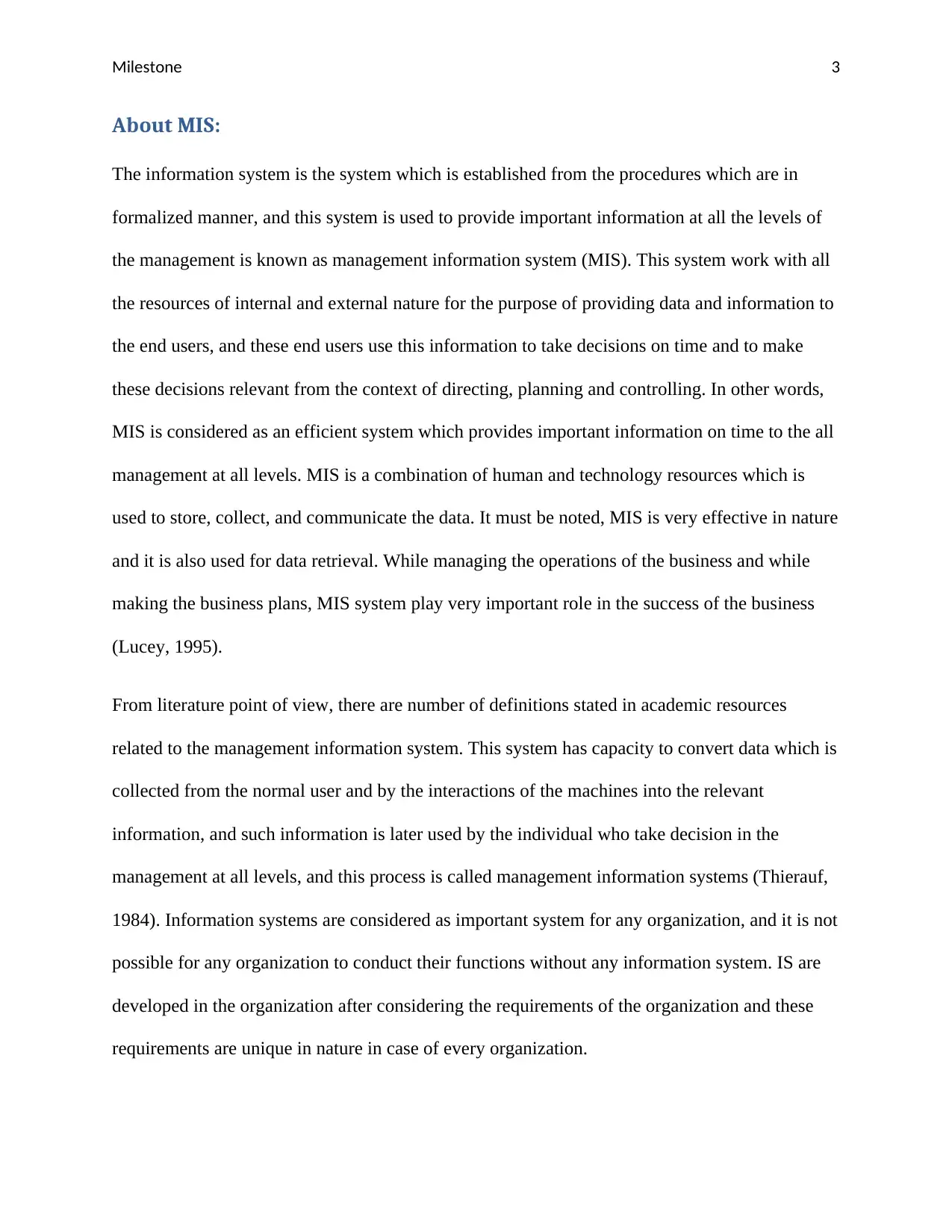
Milestone 3
About MIS:
The information system is the system which is established from the procedures which are in
formalized manner, and this system is used to provide important information at all the levels of
the management is known as management information system (MIS). This system work with all
the resources of internal and external nature for the purpose of providing data and information to
the end users, and these end users use this information to take decisions on time and to make
these decisions relevant from the context of directing, planning and controlling. In other words,
MIS is considered as an efficient system which provides important information on time to the all
management at all levels. MIS is a combination of human and technology resources which is
used to store, collect, and communicate the data. It must be noted, MIS is very effective in nature
and it is also used for data retrieval. While managing the operations of the business and while
making the business plans, MIS system play very important role in the success of the business
(Lucey, 1995).
From literature point of view, there are number of definitions stated in academic resources
related to the management information system. This system has capacity to convert data which is
collected from the normal user and by the interactions of the machines into the relevant
information, and such information is later used by the individual who take decision in the
management at all levels, and this process is called management information systems (Thierauf,
1984). Information systems are considered as important system for any organization, and it is not
possible for any organization to conduct their functions without any information system. IS are
developed in the organization after considering the requirements of the organization and these
requirements are unique in nature in case of every organization.
About MIS:
The information system is the system which is established from the procedures which are in
formalized manner, and this system is used to provide important information at all the levels of
the management is known as management information system (MIS). This system work with all
the resources of internal and external nature for the purpose of providing data and information to
the end users, and these end users use this information to take decisions on time and to make
these decisions relevant from the context of directing, planning and controlling. In other words,
MIS is considered as an efficient system which provides important information on time to the all
management at all levels. MIS is a combination of human and technology resources which is
used to store, collect, and communicate the data. It must be noted, MIS is very effective in nature
and it is also used for data retrieval. While managing the operations of the business and while
making the business plans, MIS system play very important role in the success of the business
(Lucey, 1995).
From literature point of view, there are number of definitions stated in academic resources
related to the management information system. This system has capacity to convert data which is
collected from the normal user and by the interactions of the machines into the relevant
information, and such information is later used by the individual who take decision in the
management at all levels, and this process is called management information systems (Thierauf,
1984). Information systems are considered as important system for any organization, and it is not
possible for any organization to conduct their functions without any information system. IS are
developed in the organization after considering the requirements of the organization and these
requirements are unique in nature in case of every organization.
⊘ This is a preview!⊘
Do you want full access?
Subscribe today to unlock all pages.

Trusted by 1+ million students worldwide
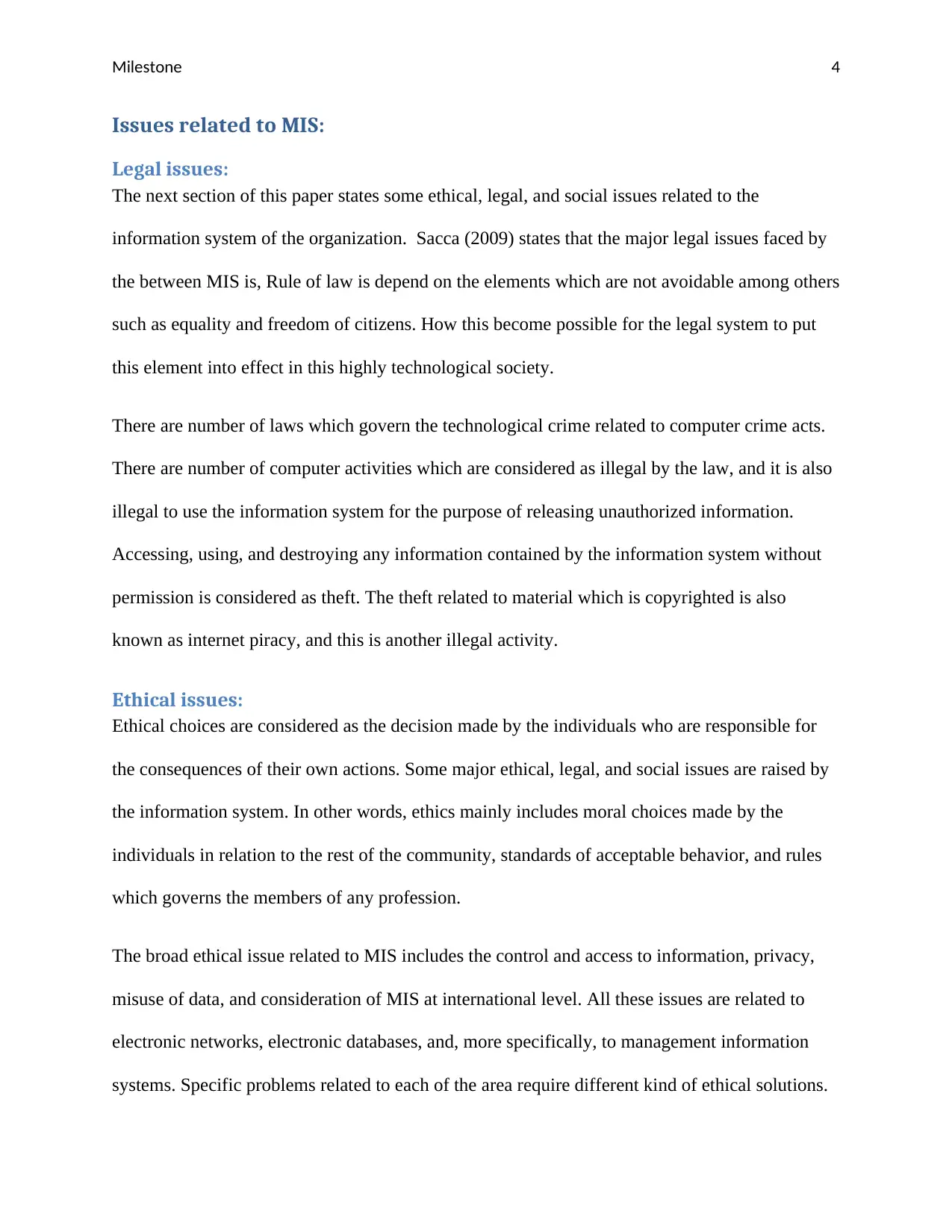
Milestone 4
Issues related to MIS:
Legal issues:
The next section of this paper states some ethical, legal, and social issues related to the
information system of the organization. Sacca (2009) states that the major legal issues faced by
the between MIS is, Rule of law is depend on the elements which are not avoidable among others
such as equality and freedom of citizens. How this become possible for the legal system to put
this element into effect in this highly technological society.
There are number of laws which govern the technological crime related to computer crime acts.
There are number of computer activities which are considered as illegal by the law, and it is also
illegal to use the information system for the purpose of releasing unauthorized information.
Accessing, using, and destroying any information contained by the information system without
permission is considered as theft. The theft related to material which is copyrighted is also
known as internet piracy, and this is another illegal activity.
Ethical issues:
Ethical choices are considered as the decision made by the individuals who are responsible for
the consequences of their own actions. Some major ethical, legal, and social issues are raised by
the information system. In other words, ethics mainly includes moral choices made by the
individuals in relation to the rest of the community, standards of acceptable behavior, and rules
which governs the members of any profession.
The broad ethical issue related to MIS includes the control and access to information, privacy,
misuse of data, and consideration of MIS at international level. All these issues are related to
electronic networks, electronic databases, and, more specifically, to management information
systems. Specific problems related to each of the area require different kind of ethical solutions.
Issues related to MIS:
Legal issues:
The next section of this paper states some ethical, legal, and social issues related to the
information system of the organization. Sacca (2009) states that the major legal issues faced by
the between MIS is, Rule of law is depend on the elements which are not avoidable among others
such as equality and freedom of citizens. How this become possible for the legal system to put
this element into effect in this highly technological society.
There are number of laws which govern the technological crime related to computer crime acts.
There are number of computer activities which are considered as illegal by the law, and it is also
illegal to use the information system for the purpose of releasing unauthorized information.
Accessing, using, and destroying any information contained by the information system without
permission is considered as theft. The theft related to material which is copyrighted is also
known as internet piracy, and this is another illegal activity.
Ethical issues:
Ethical choices are considered as the decision made by the individuals who are responsible for
the consequences of their own actions. Some major ethical, legal, and social issues are raised by
the information system. In other words, ethics mainly includes moral choices made by the
individuals in relation to the rest of the community, standards of acceptable behavior, and rules
which governs the members of any profession.
The broad ethical issue related to MIS includes the control and access to information, privacy,
misuse of data, and consideration of MIS at international level. All these issues are related to
electronic networks, electronic databases, and, more specifically, to management information
systems. Specific problems related to each of the area require different kind of ethical solutions.
Paraphrase This Document
Need a fresh take? Get an instant paraphrase of this document with our AI Paraphraser
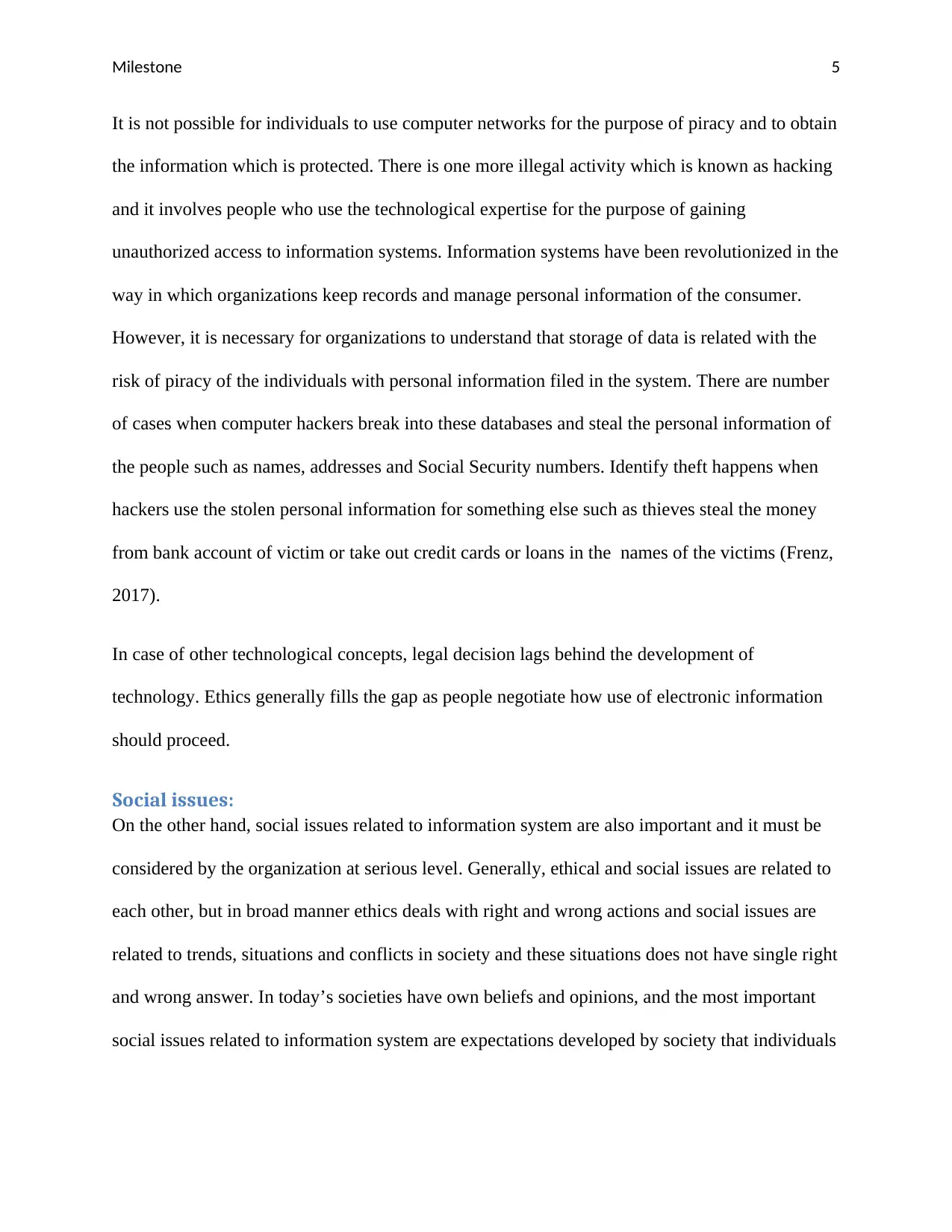
Milestone 5
It is not possible for individuals to use computer networks for the purpose of piracy and to obtain
the information which is protected. There is one more illegal activity which is known as hacking
and it involves people who use the technological expertise for the purpose of gaining
unauthorized access to information systems. Information systems have been revolutionized in the
way in which organizations keep records and manage personal information of the consumer.
However, it is necessary for organizations to understand that storage of data is related with the
risk of piracy of the individuals with personal information filed in the system. There are number
of cases when computer hackers break into these databases and steal the personal information of
the people such as names, addresses and Social Security numbers. Identify theft happens when
hackers use the stolen personal information for something else such as thieves steal the money
from bank account of victim or take out credit cards or loans in the names of the victims (Frenz,
2017).
In case of other technological concepts, legal decision lags behind the development of
technology. Ethics generally fills the gap as people negotiate how use of electronic information
should proceed.
Social issues:
On the other hand, social issues related to information system are also important and it must be
considered by the organization at serious level. Generally, ethical and social issues are related to
each other, but in broad manner ethics deals with right and wrong actions and social issues are
related to trends, situations and conflicts in society and these situations does not have single right
and wrong answer. In today’s societies have own beliefs and opinions, and the most important
social issues related to information system are expectations developed by society that individuals
It is not possible for individuals to use computer networks for the purpose of piracy and to obtain
the information which is protected. There is one more illegal activity which is known as hacking
and it involves people who use the technological expertise for the purpose of gaining
unauthorized access to information systems. Information systems have been revolutionized in the
way in which organizations keep records and manage personal information of the consumer.
However, it is necessary for organizations to understand that storage of data is related with the
risk of piracy of the individuals with personal information filed in the system. There are number
of cases when computer hackers break into these databases and steal the personal information of
the people such as names, addresses and Social Security numbers. Identify theft happens when
hackers use the stolen personal information for something else such as thieves steal the money
from bank account of victim or take out credit cards or loans in the names of the victims (Frenz,
2017).
In case of other technological concepts, legal decision lags behind the development of
technology. Ethics generally fills the gap as people negotiate how use of electronic information
should proceed.
Social issues:
On the other hand, social issues related to information system are also important and it must be
considered by the organization at serious level. Generally, ethical and social issues are related to
each other, but in broad manner ethics deals with right and wrong actions and social issues are
related to trends, situations and conflicts in society and these situations does not have single right
and wrong answer. In today’s societies have own beliefs and opinions, and the most important
social issues related to information system are expectations developed by society that individuals
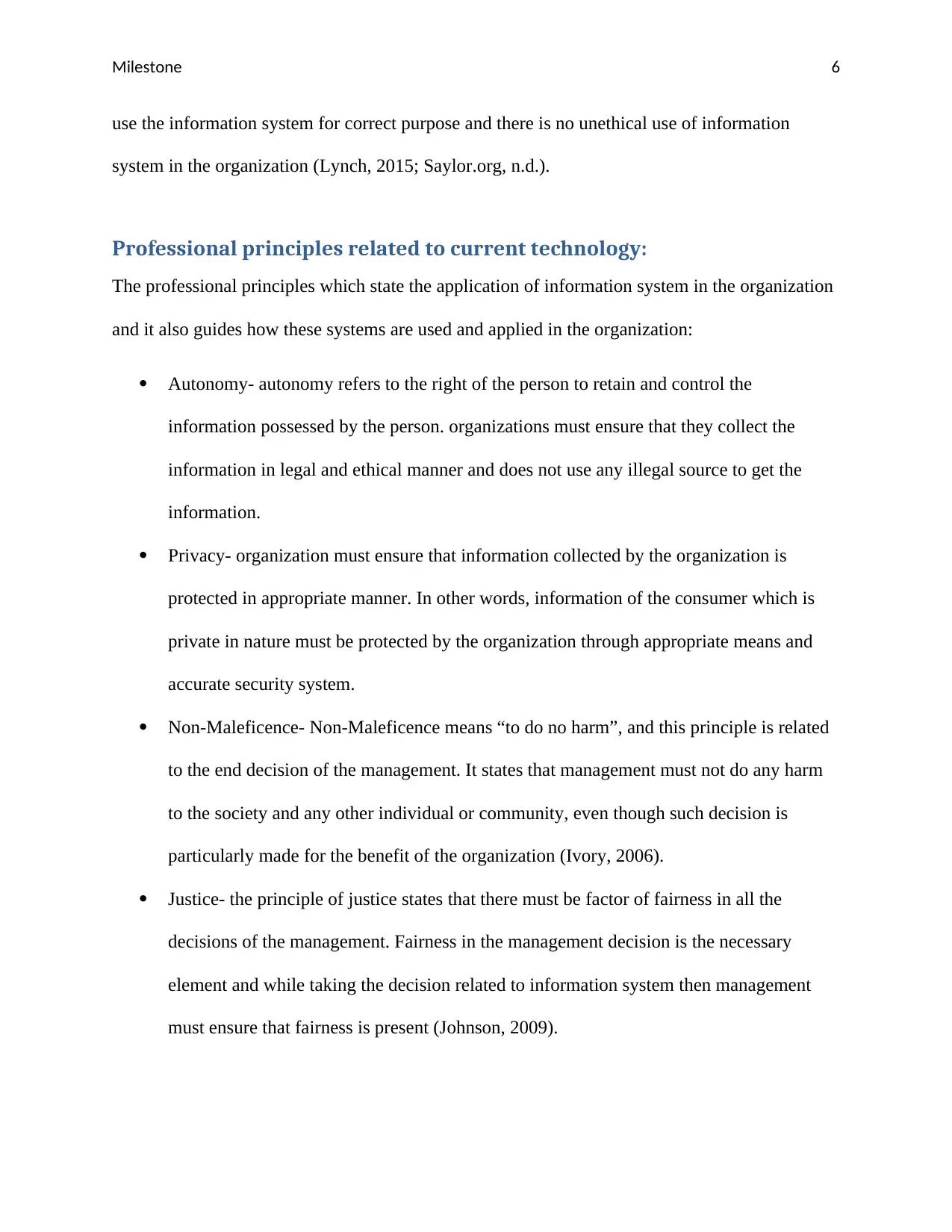
Milestone 6
use the information system for correct purpose and there is no unethical use of information
system in the organization (Lynch, 2015; Saylor.org, n.d.).
Professional principles related to current technology:
The professional principles which state the application of information system in the organization
and it also guides how these systems are used and applied in the organization:
Autonomy- autonomy refers to the right of the person to retain and control the
information possessed by the person. organizations must ensure that they collect the
information in legal and ethical manner and does not use any illegal source to get the
information.
Privacy- organization must ensure that information collected by the organization is
protected in appropriate manner. In other words, information of the consumer which is
private in nature must be protected by the organization through appropriate means and
accurate security system.
Non-Maleficence- Non-Maleficence means “to do no harm”, and this principle is related
to the end decision of the management. It states that management must not do any harm
to the society and any other individual or community, even though such decision is
particularly made for the benefit of the organization (Ivory, 2006).
Justice- the principle of justice states that there must be factor of fairness in all the
decisions of the management. Fairness in the management decision is the necessary
element and while taking the decision related to information system then management
must ensure that fairness is present (Johnson, 2009).
use the information system for correct purpose and there is no unethical use of information
system in the organization (Lynch, 2015; Saylor.org, n.d.).
Professional principles related to current technology:
The professional principles which state the application of information system in the organization
and it also guides how these systems are used and applied in the organization:
Autonomy- autonomy refers to the right of the person to retain and control the
information possessed by the person. organizations must ensure that they collect the
information in legal and ethical manner and does not use any illegal source to get the
information.
Privacy- organization must ensure that information collected by the organization is
protected in appropriate manner. In other words, information of the consumer which is
private in nature must be protected by the organization through appropriate means and
accurate security system.
Non-Maleficence- Non-Maleficence means “to do no harm”, and this principle is related
to the end decision of the management. It states that management must not do any harm
to the society and any other individual or community, even though such decision is
particularly made for the benefit of the organization (Ivory, 2006).
Justice- the principle of justice states that there must be factor of fairness in all the
decisions of the management. Fairness in the management decision is the necessary
element and while taking the decision related to information system then management
must ensure that fairness is present (Johnson, 2009).
⊘ This is a preview!⊘
Do you want full access?
Subscribe today to unlock all pages.

Trusted by 1+ million students worldwide
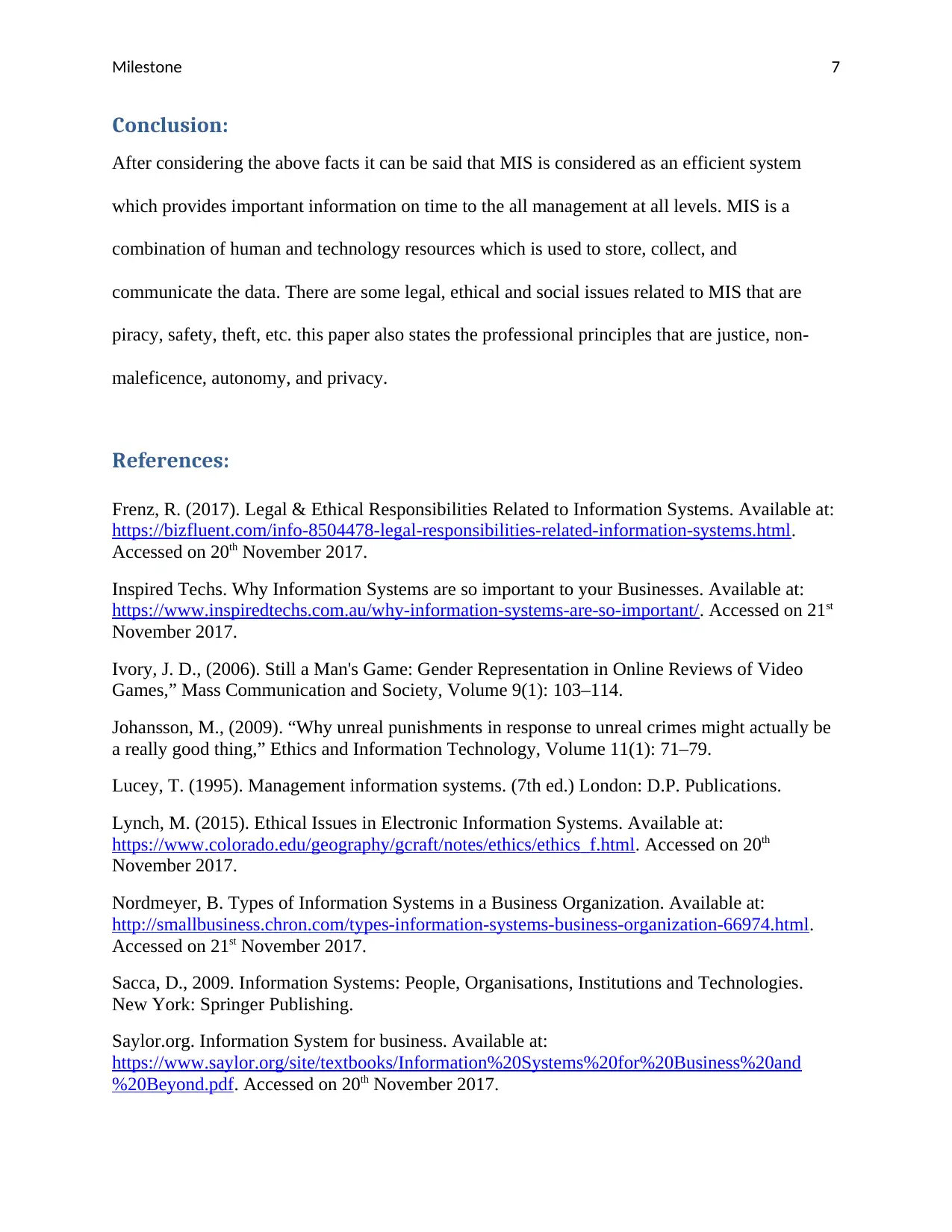
Milestone 7
Conclusion:
After considering the above facts it can be said that MIS is considered as an efficient system
which provides important information on time to the all management at all levels. MIS is a
combination of human and technology resources which is used to store, collect, and
communicate the data. There are some legal, ethical and social issues related to MIS that are
piracy, safety, theft, etc. this paper also states the professional principles that are justice, non-
maleficence, autonomy, and privacy.
References:
Frenz, R. (2017). Legal & Ethical Responsibilities Related to Information Systems. Available at:
https://bizfluent.com/info-8504478-legal-responsibilities-related-information-systems.html.
Accessed on 20th November 2017.
Inspired Techs. Why Information Systems are so important to your Businesses. Available at:
https://www.inspiredtechs.com.au/why-information-systems-are-so-important/. Accessed on 21st
November 2017.
Ivory, J. D., (2006). Still a Man's Game: Gender Representation in Online Reviews of Video
Games,” Mass Communication and Society, Volume 9(1): 103–114.
Johansson, M., (2009). “Why unreal punishments in response to unreal crimes might actually be
a really good thing,” Ethics and Information Technology, Volume 11(1): 71–79.
Lucey, T. (1995). Management information systems. (7th ed.) London: D.P. Publications.
Lynch, M. (2015). Ethical Issues in Electronic Information Systems. Available at:
https://www.colorado.edu/geography/gcraft/notes/ethics/ethics_f.html. Accessed on 20th
November 2017.
Nordmeyer, B. Types of Information Systems in a Business Organization. Available at:
http://smallbusiness.chron.com/types-information-systems-business-organization-66974.html.
Accessed on 21st November 2017.
Sacca, D., 2009. Information Systems: People, Organisations, Institutions and Technologies.
New York: Springer Publishing.
Saylor.org. Information System for business. Available at:
https://www.saylor.org/site/textbooks/Information%20Systems%20for%20Business%20and
%20Beyond.pdf. Accessed on 20th November 2017.
Conclusion:
After considering the above facts it can be said that MIS is considered as an efficient system
which provides important information on time to the all management at all levels. MIS is a
combination of human and technology resources which is used to store, collect, and
communicate the data. There are some legal, ethical and social issues related to MIS that are
piracy, safety, theft, etc. this paper also states the professional principles that are justice, non-
maleficence, autonomy, and privacy.
References:
Frenz, R. (2017). Legal & Ethical Responsibilities Related to Information Systems. Available at:
https://bizfluent.com/info-8504478-legal-responsibilities-related-information-systems.html.
Accessed on 20th November 2017.
Inspired Techs. Why Information Systems are so important to your Businesses. Available at:
https://www.inspiredtechs.com.au/why-information-systems-are-so-important/. Accessed on 21st
November 2017.
Ivory, J. D., (2006). Still a Man's Game: Gender Representation in Online Reviews of Video
Games,” Mass Communication and Society, Volume 9(1): 103–114.
Johansson, M., (2009). “Why unreal punishments in response to unreal crimes might actually be
a really good thing,” Ethics and Information Technology, Volume 11(1): 71–79.
Lucey, T. (1995). Management information systems. (7th ed.) London: D.P. Publications.
Lynch, M. (2015). Ethical Issues in Electronic Information Systems. Available at:
https://www.colorado.edu/geography/gcraft/notes/ethics/ethics_f.html. Accessed on 20th
November 2017.
Nordmeyer, B. Types of Information Systems in a Business Organization. Available at:
http://smallbusiness.chron.com/types-information-systems-business-organization-66974.html.
Accessed on 21st November 2017.
Sacca, D., 2009. Information Systems: People, Organisations, Institutions and Technologies.
New York: Springer Publishing.
Saylor.org. Information System for business. Available at:
https://www.saylor.org/site/textbooks/Information%20Systems%20for%20Business%20and
%20Beyond.pdf. Accessed on 20th November 2017.
Paraphrase This Document
Need a fresh take? Get an instant paraphrase of this document with our AI Paraphraser
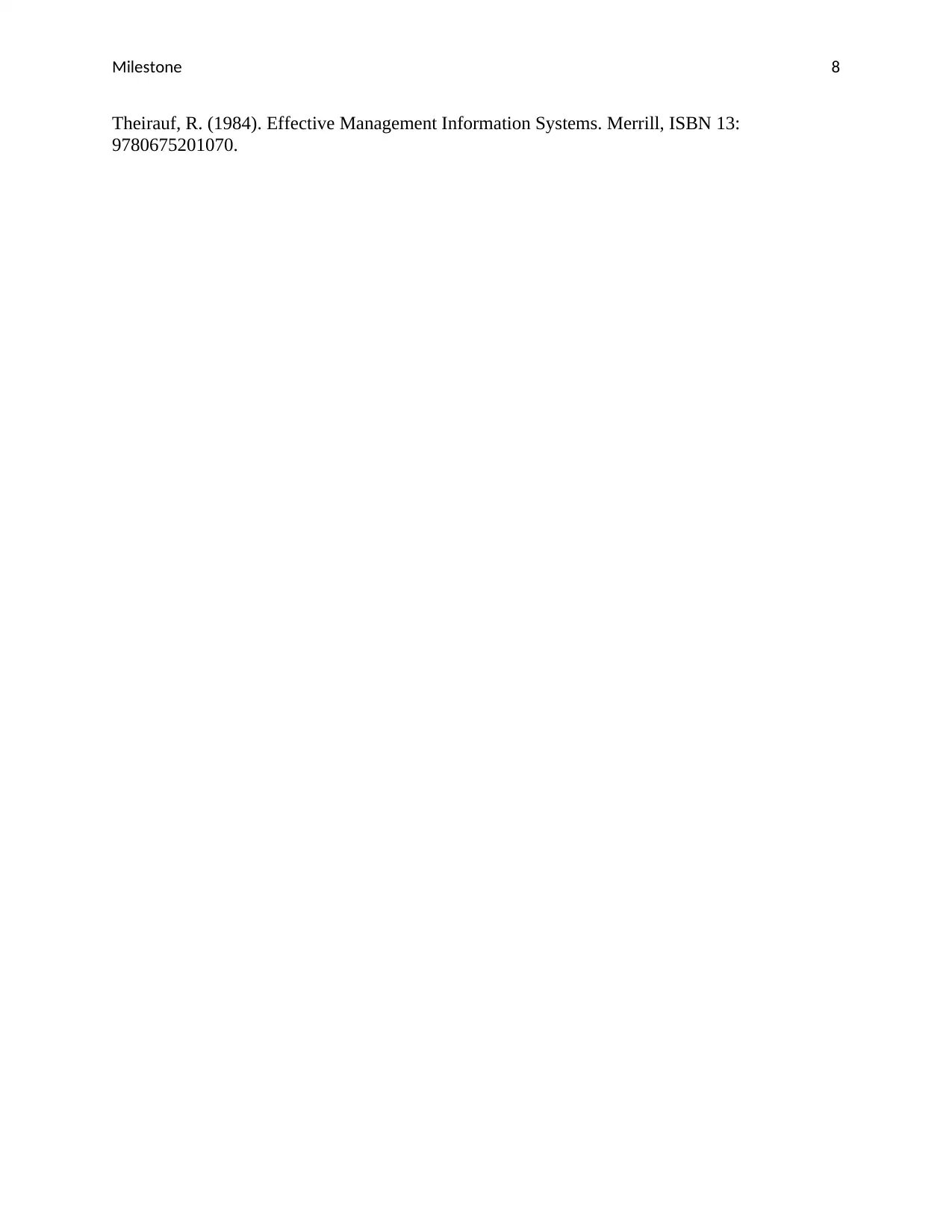
Milestone 8
Theirauf, R. (1984). Effective Management Information Systems. Merrill, ISBN 13:
9780675201070.
Theirauf, R. (1984). Effective Management Information Systems. Merrill, ISBN 13:
9780675201070.
1 out of 8
Related Documents
Your All-in-One AI-Powered Toolkit for Academic Success.
+13062052269
info@desklib.com
Available 24*7 on WhatsApp / Email
![[object Object]](/_next/static/media/star-bottom.7253800d.svg)
Unlock your academic potential
Copyright © 2020–2025 A2Z Services. All Rights Reserved. Developed and managed by ZUCOL.




